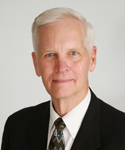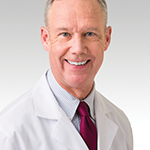Many, if not all, rheumatologists seek to grow as clinicians so they can provide consistently exceptional care to patients and serve as role models for colleagues and trainees. In our Lessons from Master Clinicians series for The Rheumatologist, we present insights from clinicians who have achieved distinction in the field of rheumatology and who are respected by other rheumatologists for their exceptional clinical reasoning, knowledge across a wide range of medical specialties and patient-centered care.
Following 30+ years as the Fellowship Director, Sterling G. West, MD, MACP, MACR, is professor of medicine at the University of Colorado School of Medicine, Aurora, Colo., and co-director of the Metabolic Bone Disease Clinic. Dr. West received his undergraduate degree from the U.S. Military Academy at West Point, New York, and his medical degree from the Emory University School of Medicine, Atlanta. He completed a residency in internal medicine at Fitzsimons Army Medical Center and a fellowship in rheumatology at Walter Reed Army Medical Center. He is board certified in internal medicine and rheumatology and is an ACR Master and a Master of the American College of Physicians (ACP).
Dr. West’s major focus continues to be on patient care and teaching. His research interests include neuropsychiatric lupus and uncommon rheumatic diseases. He has published more than 100 original articles and book chapters. He is editor of the book, Rheumatology Secrets. He is past deputy editor of Arthritis & Rheumatism and has served on the American Board of Internal Medicine’s Certifying Examination Committee and Self Evaluation Program Test Committee in Rheumatology. Additionally, he is a reviewer for Arthritis & Rheumatology, Journal of Rheumatology and the Annals of Internal Medicine.
Dr. West has received many honors and awards, including the University of Colorado Full-Time Physician of the Year Award, ACP Laureate Award, the ACR Distinguished Clinician Scholar Award and the ACR Distinguished Fellowship Director Award. Dr. West recently spoke with The Rheumatologist about his experiences in rheumatology.
Q: In your opinion, what makes for a master clinician?
A: A master clinician should be an inspiring leader and role model. They should have several attributes, including a superior fund of knowledge, excellent clinical judgment, integrity and the highest ethical and moral standards of professionalism. They should possess exceptional interpersonal and communication skills with patients, colleagues and administrators. Finally, they should be an outstanding educator, eager to learn new knowledge and techniques, but most of all willing to devote time to share their wisdom with mentees and other learners.
The attributes of a master clinician are what we should all strive to achieve. No one can achieve them all. I certainly have not, but I keep trying.
Q: Who were a few of your clinician role models, and what qualities did you admire in these individuals?
A: I did my medical training and spent the first half—24 years—of my medical career in the U.S. Army. The rheumatologist who inspired me to go into rheumatology was Robert Claypool, MD. When I first met him, he was a lieutenant colonel who rose through the ranks and finished his outstanding career as a major general. He was an excellent rheumatologist who was an amazing leader and motivator. I consider him my mentor.
While in the military, I was able to invite multiple outstanding clinicians to be visiting professors. Those who I considered master clinicians, who influenced me early in my career due to their depth of knowledge and expertise, included William Kelley, MD, Dan McCarty, MD, Bevra Hahn, MD, Jack Klippel, MD, and Doyt Conn, MD—to name just a few.
Q: What habits can a fellow-in-training or junior rheumatologist incorporate into daily practice to build on their skills as a clinician?
A: Learn from the patients you see, and learn from the mistakes you will make. You can read about a disease in a book, but until you actually take care of a patient with that disease you really can’t improve your skill as a clinician. You need to admit when you don’t know what the diagnosis is, but be willing to follow the patient, get help from other colleagues and pursue a diagnosis until you get it correct. You need to track patient outcomes to see if the diagnosis is correct and that therapies you treat the patient with actually help the patient. Over the years, these experiences will be invaluable in your development. If possible, establish a network of colleagues to discuss and get help on cases. No one can know it all.
Q: What lessons have you learned from patients that have contributed to your growth as a clinician?
A: Patients have taught me how difficult it is to live with a chronic autoimmune disease. This [interaction] has increased my compassion and understanding for their situations.
Patients have also taught me humility. Patients don’t always present with classic signs and symptoms of a disease or respond to therapy the way the textbook says they are supposed to respond. Many times, I have thought, ‘This can’t be a rheumatic disease,’ only to find out after following them for a while that they are presenting in an atypical fashion. Rheumatology is an interesting and challenging subspecialty, and that’s why we love it.
Q: Many rheumatology fellows across the country know you as the editor of the textbook, Rheumatology Secrets. Do you feel that editing a book or writing medical journal articles makes you a better clinician? And if so, how do these activities translate into the way you think about and care for patients?
A: Scholarly activities, such as editing a textbook or writing medical journal articles, can certainly add to your clinical expertise. It does this by increasing your depth of understanding about whatever disease you are researching.
I have greatly enjoyed editing Rheumatology Secrets. The contributions to the various chapters by clinical experts in the field have helped me a lot. Truth be told, the only way I can stay ahead of the rheumatology fellows in our program is to have edited this book.
Jason Liebowitz, MD, is a second-year fellow in rheumatology at Johns Hopkins University. He earned his MD from Johns Hopkins University School of Medicine and completed his residency at Johns Hopkins Bayview.




